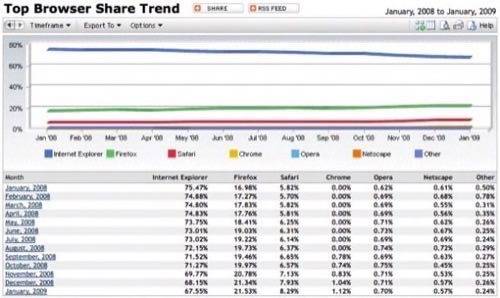It might take a few more years, or it might happen suddenly, but trends appear to indicate that the time when Internet Explorer is used by the majority of people on the web will soon come to an end.

New numbers from analytics firm Net Applications put IE at a mere 67.5%, having dropped more than 7% last year. The bulk of that loss is coming from users of IE 6, an 8 year old browser that many users now appear to be replacing with Firefox, Safari or Chrome, instead of updated versions of IE.

The remaining 20% of web users still using IE 6 could rapidly defect and switch teams to Firefox or Chrome, changing the market share numbers all the more. Who would have thought that a day would come so soon when only 2/3 of web users were using IE? We wouldn’t be surprised to see that number fall below 50% relatively soon.
As CNet reports Internet Explorer’s drop of seven percentage point since February last year is a continuing trend. Microsoft lost over nine percent of browser market share in the preceding two years.
Now the world has the leading search company pushing its browser, a new mobile version of Firefox will launch soon and the global market for dirt cheap laptops or netbooks is likely to explode in the next few years. How many of those machines will run something other than Explorer? We expect quite a few.
What would the fall of IE mean? It could mean the rise of open, extensible, safer and more contemporary browsers. Perhaps the new IE 8 will change all our lives, though!
Update:Joe Wilcox at EWeek challenges these and Net Applications’ numbers in general. That’s an interesting read, too.

















